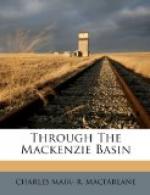Its continuation, called “The Narrows,” now flowed in a troubled channel, crossed in all directions by jutting boulders, full of tortuous snies, to be groped along dexterously with the poles, but dropped at last into better water, ending at a portage, where we dined. This portage led to the farmhouse of a Mr. Houle, a native of Red River, who had left St. Vital fifty-eight years before, and was now settled at a beautiful spot on the right bank of the river, and had horses, cows and other cattle, a garden, and raised wheat and other grain, which he said did well, and was evidently prosperous. After a regale of milk we embarked for the first Wahpooskow lake, which we reached in the afternoon.
This is a fine and comparatively clear sheet of water, much frequented by the natives. The day was beautiful, and with a fair wind and sails up we passed point after point sprinkled with the cabins and tepees of the Indians and half-breeds. It was perfectly charming to sweep up to and past these primitive lodgings, with a spanking breeze, and the dancing waves seething around our bows. Small patches of potatoes met the eye at every house, making our mouths water with expectation, for we had now been a long time without them, and it is only then that one realizes their value. In the far distance we discerned the Roman Catholic Mission church, the primitive building showing up boldly in the offing, whilst our canoemen, now nearing their own home, broke into an Indian chant, and were in high spirits. They expected a big feast that night, and so did we! I had been a bit under the weather, with flagging appetite, but felt again the grip of healthy hunger.
We were now in close contact with the most innocently wild, secluded, and apparently happy state of things imaginable—a real Utopia, such as Sir Thomas More dreamt not of, being actually here, with no trace of abortive politics or irritating ordinance. Here was contentment in the savage wilderness—communion with Nature in all her unstained purity and beauty. One thought of the many men of mind who had moralized on this primitive life, and, tired of towns, of “the weariness, the fever and the fret” of civilization, had abandoned all and found rest and peace in the bosom of Mother Nature.
The lake now narrowed into a deep but crooked stream, fringed, as usual, by tall reeds and rushes and clumps of flowering water-lilies. A four-mile paddle brought us to a long stretch of deep lake, the second Wahpooskow, lined on the north by a lovely shore, dotted with cabins, the central tall buildings upon the summit of the rising ground being those of the English “Church Mission Society,” in charge of the Reverend Charles R. Weaver. Here we were at last at the inland end of our journey, at Wahpooskow—this, not the “Wabiscow” of the maps, being the right spelling and pronunciation of the word, which means in English “The Grassy Narrows.”




